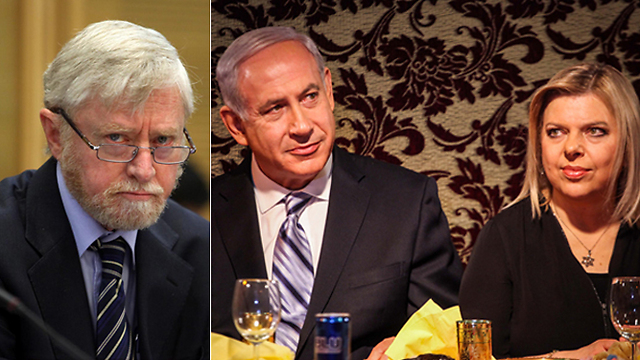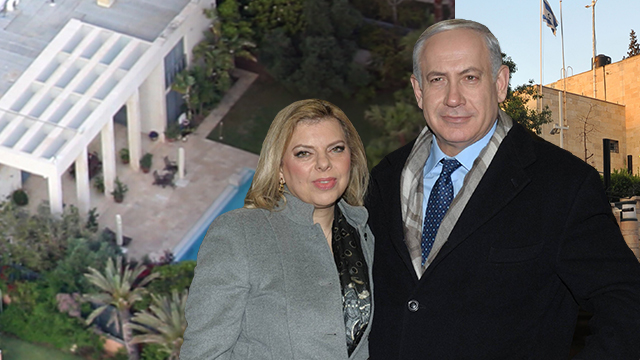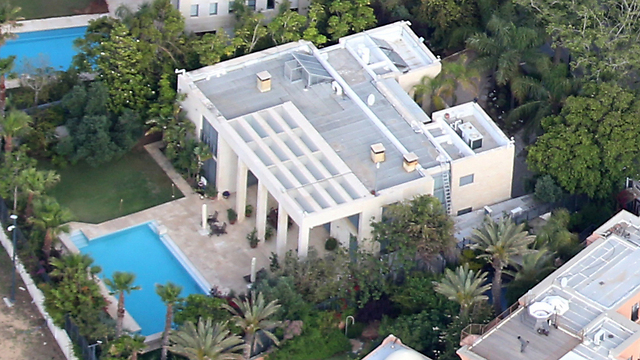
Comptroller: Netanyahu family spending raises concerns of criminal activity
State Comptroller Yosef Shapira releases report on expenditure of Prime Minister's Office; announces suspected criminal behavior in findings into bottle affair and garden furniture affair.
State Comptroller Yosef Shapira on Tuesday expressed his concerns over possible criminal activity in two separate affairs regarding the spending at Prime Minister Benjamin Netanyahu's official residence: The so-called "bottle" and "garden furniture" affairs.
The much anticipated probe into the spending of the Prime Minister's Office was released Tuesday, shedding light into what can now be confirmed as excessive spending by Netanyahu in his years in office.
The probe examined the spending of the Prime Minister's Residence in Jerusalem and the Netanyahus' private home in Caesarea.
The State Comptroller's report reveals that the Netanyahu family spent excessive funds at the public's expense. For example, the funds for food doubled to half a million shekel in a year. The cleaning and clothing expenses were also excessive, according to the report.
The probe also reveals that employees of the Prime Minister's Residence on Balfour Street in Jerusalem personally financed Netanyahu's expenses and never received reimbursements. Other troublesome findings include Sara Netanyahu hiring a private electrician and former Likud Center member, who habitually arrived at the Netanyahu family's private home almost every weekend for three months and was paid using state funding.

Shapira announced his suspicion of foul play regarding the bottle affair (in which Sara Netanyahu was accused of personally taking funds received from recycling state-funded beverage bottles) and the garden furniture affair (in which the Netanyahu family was accused of purchasing new furniture for their private home that was intended for the Prime Minister's Residence).
Netanyahu's expenditure
Along with the official Prime Minister's Residence on Balfour Street in Jerusalem, Netanyahu owns two other homes – in the coastal city of Ceasarea and on Gaza Street in Jerusalem.
The report by the State Comptroller reveals that the total expenditure of the Prime Minister's Residence in 2009 stood at NIS 1,860,000. In 2010, the spending rose to NIS 2,400,000 and in 2011 the spending reached a record NIS 3,114,000 – almost two times as much as the Prime Minister's spending in 2009.
In 2012, the spending slightly decreased to NIS 2,864,000 and in 2013 the spending further decreased to NIS 2,410,000 – although the total expenditure was still higher than the spending in 2009.
The state comptroller's report revealed that in 2011 and 2012 the expenditure on food and hospitality more than doubled compared to the expenditure on food and hospitality during the first year of Netanyahu's second term.
The spending rose from NIS 211,000 in 2009 to NIS 490,000 in 2011. The spending then decreased to NIS 458,000 in 2012 and a year later there was a significant decrease in the spending on food and hospitality to NIS 226,000 in 2013.
The state comptroller also noted that "when one does not employ an official cook, it is permitted to order prepared food to the residence from contractors and service providers."
From March 2009 until March 2013, the Prime Minister's Residence did not employ an official cook (despite the fact that one of the cleaners also provided cooking services).
The spending of the Prime Minister's Residence on meals from 2010-3013 was as follows: NIS 70,000, NIS 92,000, NIS 158,000, and NIS 64,000 respectively.
"The report found that the option to order private meals for the Prime Minister, his family and his guests was utilized on a regular basis, even when there was a woman working as a cook at the residence, despite the high cost of the expense, which is financed by the public. This contradicts the basic principles of saving and proportionality," Shapira wrote.
The state comptroller said that "the way in which the budget of the Prime Minister's Residence was managed during the years 2009-2012 does not comply with the basic principles of money management, saving, and efficiency and is likely to result in a waste of public funds."
He referred to the Knesset Finance Committee's decision that "the funding of the expenses of the prime minister, his wife and children still living under his roof, includes the purchase of food products without limit."
The state comptroller noted that "the expenditure on food orders was larger than just the cost of the orders."
The Prime Minister's Office's accountant wrote that there are "accompanied costs, such as the cost of a driver and vehicle to transport the meals and the supervision of the entire process – from the moment the food is prepared by the cooks until it arrives at the Prime Minister's Residence."
"Thus, even when the cleaning lady served as the residence's cook, food was ordered to the residence," the comptroller stated. "In 2010, meals were ordered for a total cost of NIS 70,851, which marks 27 percent of the general spending on food during that year, even though there was someone who served as a cook at the residence. The conduct of the Prime Minister's Office, which enabled the purchase of this scope for meals when there was someone serving as a cook at the residence, is improper," wrote the State Comptroller in the report.
State Comptroller Shapira added: "It is possible to employ a full time cook and save public funds, as it was done in 2013."
In addition, the state comptroller referred to spending on goods, not including food orders. This spending stood at NIS 16,346 per month on average in 2010. In 2011, the monthly spending rose to NIS 30,602 and went down to NIS 26,763 in 2012 and NIS 15,167 in 2013.
The data shows that only in 2013, a year in which an analysis was conducted in order to determine the budget, expenses decreased significantly. The state comptroller criticized the high expenditure in the years before 2013 and said the residence "could have operated differently to save public funds even in earlier years."
Expensive cleaning
Spending on cleaning for the Prime Minister's Residence in Jerusalem and his private home in Caesarea stood at NIS 532,000 in 2009. In 2010, the spending increased and reached a total of NIS 776,000 – NIS 85,000 of which were spent on Netanyahu's private home in Caesarea. In 2011, cleaning costs reached NIS 1,230,000 – NIS 87,000 of which were spent on the family's private home. Thus, spending on cleaning in 2011 more than doubled compared to the spending on cleaning in 2009.The state cost for Netanyahu's cleaning stood at NIS 102,000 per month for the cleaning of both Netanyahu's private home and the Prime Minister's Residence in Jerusalem.
The Yom Kippur electrician
Another section of the state comptroller's report dealt with electrical work that was ordered for Netanyahu's private home in Caesarea. The prime minister can use state funds for a private electrician if it is a pressing situation that occurs during the weekend, a holiday or after work hours and cannot wait to be fixed during regular work hours.According to the state comptroller's report, the Financial Committee decided that Netanyahu could not employ a private electrician whom he had employed in the past because he was previously a member of the Likud Center. The report mentions that the employee, referred to as electrician E. in the report, had hosted the Netanyahu family for the Mimuna celebrations in Passover of 2010.
The electrician Netanyahu was barred from employing is Eli Pahima, a resident of Or Akiva – although the report did not name him.
Despite the decision by the committee to ban Netanyahu from employing Pahima using state funds, "he was contracted to do electrical work at the private residence. It was done under false pretenses in which it appeared that a different contractor was brought in, however, in reality electrician E. did the work as a subcontractor."
The report further detailed the incident: "A review of output charges for the work performed by the enterprise winner shows that for three months, from September to November, 2009, NIS 10,500 were utilized, which is about 70 percent of the NIS 15,000 budget that is allocated for an entire year. Moreover, it was found that during these three months service calls were reported almost every weekend, including on Yom Kippur."
The report revealed that after examining the situation, the State Comptroller found that the Prime Minister's wife, Sara Netanyahu, or one of her secretaries had ordered the electrical work from the prohibited electrician.
According to the report, Sara or one of her secretaries made direct contact with the electrical company and requested work to be completed at the Netanyahu family's private home, using state funds.
The state comptroller noted that no one had examined the necessity for the work that was ordered and that there was no examination of whether the work was actually performed, as everything was coordinated between Sara Netanyahu or one of her secretaries.
According to State Comptroller Shapira, "because the subcontractor (electrician) received direct instructions from the Prime Minister's wife and her secretaries without reporting it to the Prime Minister's Office, it was impossible to check their urgency and the urgency of the work, and make sure that it is urgent work that could not be carried out during the week by the office's workers, saving the said expenses."
The bottle affair
"On the issue of revenue received from recycled bottles, it was relayed to the State Comptroller's office that the Prime Minister's wife returned about NIS 4,000 to the Prime Minister's Residence's office. Although recycling bottles has limited fiscal returns, they are public funds, and you must 'deal with a penny as you deal with a fortune,' the State Comptroller's report read.
The garden furniture affair
The State Comptroller's probe said of the garden furniture affair: "In the initial investigation into the subject of garden furniture purchases, it was relayed to the state comptroller that new garden furniture identical to the garden furniture at the Prime Minister's Residence had been purchased and transferred to the private residence in Ceasarea. However, after the matter was made public, the furniture was returned to the official Prime Minister's Residence. It was also reported to the state comptroller's office that there is no official management or categorization of purchases made and where they are located, even though the purchases are state funded and should be supervised.
"The attorney general was updated on the subject of the report at the time, and as per his request, the complete findings were transferred to him on February 2, 2015," wrote State Comptroller Shapira in the report.
"These materials were forwarded as they raised concern that they harmed the integrity of the office, to the point that there was concern that a crime had been committed. Also transferred to the attorney general were materials relating to additional issues, which are not included in this report, of which information was given to the office of the State Comptroller after the formulation of the draft of this report, as well as material relating to individuals who are not under supervision (of the state comptroller), so that the attorney general will go further with the study of them as he sees fit."
Employees paid for PM's expenses
The Comptroller found that "employees in the Prime Minister's Office paid for the prime minister's personal expenses out of their own pockets."
The employees were not reimbursed from the petty cash box despite having presented receipts, the comptroller wrote, "which means the PMO employees absorbed the private expenses of the prime minister or his household members."
The comptroller provided several examples of such instances.
In March 2011, the deputy director of the Payments Office rejected a request made by the then-superintendent, Employee A., to reimburse him from the petty cash box. In a memo sent to Employee A., the deputy director detailed expenses for the official residence that are not approved to be reimbursed from the petty cash box, including NIS 42.18 for anti-cold medicine, NIS 32 for newspapers for the private residence, and NIS 32 for lunch.
In another memo from June 2011, a reimbursement request made by the same employee was once again denied. The then-superintendent asked to be paid back NIS 110 for lunch at a restaurant and NIS 40 for coffee and baked goods.
A memo from December of that year detailed three expenses that were not approved, including a NIS 25 glass of wine, a meal that cost NIS 39 and another meal that cost NIS 45.
The report did state, however, that "the inquiry found there were other cases in which, after the request for reimbursement was not approved, the accountants paid the employee the sum and the deputy director of the PMO's Payments Office sent the then-prime minister a request for him to pay back the sum. In all of these cases, Mr. Netanyahu or his wife paid the sum they were asked to pay back."
Regardless, the comptroller stressed that "when an employee in the Prime Minister's Office is forced to pay expenses for the prime minister out of his own pocket it is improper, and it makes no difference whether the sum is large or small."












